
Thousands of Zimbabwean nationals living in South Africa are facing an uncertain future as the government moves to terminate a special permit programme that has allowed them to reside and work legally for over a decade.
The Zimbabwe Exemption Permit (ZEP), introduced in 2009, is set to expire in June 2024, leaving nearly 180,000 individuals at risk of deportation. The decision has ignited widespread concern among human rights groups and migrant communities.
Why is South Africa Ending the ZEP?
South African officials argue that the permits were always intended as a temporary measure to assist Zimbabweans fleeing economic and political turmoil. However, critics accuse the government of bowing to anti-immigrant sentiment ahead of elections.
"This move will devastate families who have built lives here," said a spokesperson for the Zimbabwean Migrants Support Network. "Many have children born in South Africa and no homes to return to."
Humanitarian Concerns Mount
Advocates warn that mass deportations could:
- Separate families with mixed immigration statuses
- Overwhelm Zimbabwe's struggling economy
- Create a humanitarian crisis at border crossings
The South African government maintains that those affected can apply for alternative visas, but many migrants report facing bureaucratic hurdles and excessive requirements.
Political Tensions Rise
The decision comes amid growing anti-immigrant rhetoric in South Africa, where unemployment remains high. Some political parties have blamed foreign nationals for job shortages and crime - claims that researchers say are exaggerated.
Zimbabwe's government has appealed for an extension, but Pretoria appears determined to proceed with the phase-out. As the deadline approaches, many permit holders face an impossible choice: return to a country still reeling from economic collapse or remain in South Africa as undocumented migrants.





